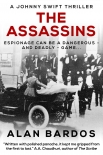The Assassins Alan Bardos (primary phonics .TXT) 📖

- Author: Alan Bardos
Book online «The Assassins Alan Bardos (primary phonics .TXT) 📖». Author Alan Bardos
Finally, after sustained questioning, it was thought that Pinkie might be at the chess school. By all accounts he was a bit of a dandy and Johnny would probably be able to identify him by his flamboyant taste in waistcoats. Johnny really missed being the unhelpful official on the other side of the desk.
After further chasing around, Johnny discovered that 'the chess school' was the nickname for the Central Cafe, an old bank building with a richly decorated, high-arched ceiling. It reminded Johnny of his recent trip to Zurich and the money he owed, further fuelling his anxiety.
To add to his problems, Libby had totally fallen in love with Vienna. Her English reserve was fading and with it her connection to Johnny; every moment they stayed there increased the danger of her finding an alternative means of diversion. Under the circumstances, he was starting to regret leaving her at a table, unsupervised, while he searched the cafe in peace.
Trying to find an Embassy official who'd play chess amongst the Bohemian types who patronised the Central was easier said than done. After accosting every man in the place wearing a vaguely flamboyant waistcoat, Johnny eventually came across a dandy in a garish pink waistcoat and cravat. He was playing chess against an intense looking man in his thirties, with steel rimmed glasses and a thick shock of black hair.
'Excuse me. Are you Pinkie?'
‘The Dandy’ glanced at Johnny, who adopted a suitable air of deference. Satisfied he'd been shown the correct amount of respect, he gave Johnny an amused look. 'Actually, it's the Honourable Pinkston Barton-Forbes.... and who might you be?'
'Jonathan Swift, sir, of the Paris Embassy.'
‘Are you really? How extraordinary, and here you are in the land of bureaucracy and music. This land doesn't fly though.’
‘No, sir,’ Johnny said impassively. He was used to his superiors making whimsical reference to his famous namesake’s work. By the look of him, Johnny guessed that the Honourable Barton-Forbes had been in his post ten years too long, with little opportunity to further his career. All he had to live for now was aggravating his juniors. Not having achieved a suitable rise from Johnny, he pointed at his hand.
'What on Earth is that?'
Johnny passed him a postcard he’d brought from a down and out on the way in; it was a painting of the Rathaus, Vienna's City Hall. Johnny had thought that the doom evoked by the Gothic spires would appeal to his mother and stepfather.
Barton-Forbes gave a snort of derision and handed it back to Johnny. 'A competent Biedermeier reproduction - mawkish and moral, for middle-class tastes, I think.' It seemed to convey everything Barton-Forbes needed to know about Johnny.
Johnny felt a sharp nudge in his back. Libby had evidently seen that he was talking to one of her sort and had wandered over for an introduction.
'The Honourable Pinkston Barton-Forbes, may I present, Lady Elizabeth Smyth. I've been escorting her to Vienna, on behalf of her husband.'
Barton-Forbes stood up and greeted Libby with dignified disdain. He then established who her 'people' were and offered her a seat at his table. He raised a questioning eyebrow to Johnny.
'Are you the Johnny that my connections tell me diddled George Smyth out of the family silver?'
'I was attempting a redistribution of wealth,' Johnny replied. He didn't know what else to say, but Barton-Forbes had already lost interest in him and begun to exchange pleasantries with Libby.
Johnny wasn't surprised that Barton-Forbes knew about his trouble with Sir George. Someone in his position, desperate to further his stalled career, would have cultivated contacts across the Diplomatic Service who were willing to do him favours and exchange information. Sir George was ideally placed to return such favours and information, and if Barton-Forbes knew about Johnny’s difficulties, Johnny hoped that meant he might actually know what he was supposed to be doing here. He was about to commit a cardinal sin and interrupt a conversation about the coming season, but his flippant comment had aroused the interest of Barton-Forbes's chess opponent.
'Why were you attempting a redistribution of wealth?' he asked Johnny, exhaling cigar smoke and evidently surprised. ‘That is quite a subversive term to hear from such an earnest looking office boy, dressed up in a frock coat.’
'I beg your pardon?' He had an accent and Johnny suspected he might be some kind of Russian emigre.
Barton-Forbes turned round. 'Oh Swift, this is Leon - Leon Trotsky. Isn't that what you call yourself these days? Leon, the lower ranks of the Diplomatic Service aren't used to being addressed by dangerous revolutionaries.'
Trotsky blew out more cigar smoke, ignoring Barton-Forbes. 'So tell me, now we've been introduced, why do you want a redistribution of wealth?'
Johnny struggled to reply - he'd once been thrashed by his Head of House for reading Trotsky's newspaper, 'Pravda' and now he was talking to the man himself. He saw that Barton-Forbes was watching so he answered Trotsky in Russian; he didn't want to damage his reputation any further. 'I would like a redistribution of wealth –‘
‘You speak Russian?’Trotsky asked, interrupting Johnny. ‘Forgive me - I am so used to your country men shouting slowly in English to make themselves understood by foreigners,’ Trotsky said, glancing at Barton-Forbes.
‘I lived in St Petersburg, when I was a child,’ Johnny replied.
‘Really? How so?’ Trotsky asked.
‘My mother was a governess to the children of a rich industrialist,’ Johnny said, embarrassed. He hoped that Barton-Forbes didn’t understand his shameful admission.
Johnny’s ‘uncle’ had arranged the position for his mother





Comments (0)